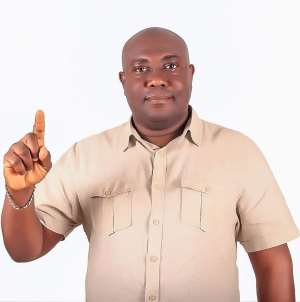
“Until politics graduates from a playground of promises into a lab of performance, we’ll keep clapping for speeches and crying over roads.” — Bismarck Kwesi Davis
WHEN POLITICS LOST ITS PEN AND COMPASS
Somewhere between a campaign slogan and a handshake at a durbar, Ghana’s political soul took a wrong turn. We replaced philosophy with populism, demoted data to a footnote, and raised rhetoric to a religion. Now, with each passing election, we don’t just vote—we hope against evidence. And when hope alone becomes our national development strategy, mediocrity wears a crown.
This is no longer about who wins power—it’s about whether power, when won, is wielded with purpose or wasted in performance. Our political system has become a confused cocktail: half science, half art, and half showbiz—yes, the math doesn’t add up, but neither does our governance. So, let us now trace the anatomy of this dysfunction and offer a cure—not in protest, but in purpose.
PART I: THE SCIENCE OF POLITICS – LOST IN TRANSLATION
Manifestos: Fiction Dressed as Policy
Every election season, political parties morph into scriptwriters. They pen lofty manifestos engineered for applause—not execution. Yet manifestos are meant to be architectural blueprints, not motivational speeches. If policies were roads, most manifestos wouldn’t pass DVLA inspection.
Data Poverty in a Resource-Rich Nation
Ghana doesn’t suffer from lack of ideas—we suffer from a shortage of facts. Research is often outsourced to political intuition rather than scientific institutions. Decisions are made before diagnoses, and we wonder why our solutions don’t solve.
Electoral Engagement as a Seasonal Festival
Political listening in Ghana is event-based—durbar here, town hall there. But national transformation requires continuous civic symphony, not campaign choruses. The science of development must be people-informed, not polling-staged.
“Without research, politics is superstition. And without delivery, it’s deception.” — Bismarck Kwesi Davis
PART II: THE ARTS OF GOVERNANCE – LEADERSHIP BEYOND THE LEDGER
Governance as Storytelling
The art of politics is in narration—the ability to link policy to people. It’s one thing to fix the economy; it’s another to explain it without sounding like an economics textbook or a bank statement read upside down.
Social Architecture and Leadership Presence
Governance without emotional intelligence is like traffic lights without electricity—confusing and occasionally dangerous. Leaders must be architects of national morale, not just auditors of budget lines.
Service Delivery as Stagecraft
Let’s face it: Ghanaian politics is more drama than discipline. Ministries become movie sets, where announcements are made, but implementation is always “coming soon.” If governance were Nollywood, we’d win Oscars—for best trailer, worst film.
PART III: THE MARRIAGE – WHEN ARTS AND SCIENCE DIVORCE, THE NATION SUFFERS
We must stop treating science and art as opposing forces. They are partners in progress. Science gives us structure; art gives us sense. Science builds the engine; art teaches us how to drive without crashing public trust.
Audit Culture Must Be Habitual, Not Hysterical
Policies must be regularly dissected—not when they fail, but while they breathe. Let feedback be constant, not ceremonial.
Transparency Must Travel Faster Than Rumour
When people don’t understand the system, they invent conspiracy theories. A decentralized communication system rooted in truth is cheaper than a million PR consultants.
Laws Must Bite, Not Bark
The Procurement Acts (663 and 914) must stop being decorative legal wallpaper. If followed with the same urgency politicians follow headlines, Ghana would be halfway to Singapore.
CONCLUSION: THE RENAISSANCE GHANA NEEDS IS NOT JUST ECONOMIC—IT’S ETHICAL
Ghana doesn’t just need roads—we need direction. Not just funding—we need focus. Not just leaders—we need learners. And not just government—we need governance.
Political excellence will not come from fiery speeches or focus group-tested slogans. It will come from the courage to blend science and soul, strategy and sincerity, vision and verification. It will demand that the man who wins power is not celebrated until he proves he can use it.
Let us therefore rise—not just as citizens who vote, but as patriots who verify, question, build, and boldly demand. This is the call: to reimagine the Republic as both a lab and a library, a studio and a spreadsheet.
Because Ghana will not be great by accident. She must be designed. Designed with logic, love, and leadership.
“To lead a nation is to harmonize the spreadsheet with the spirit. The mistake of our time is mastering one and mocking the other.” — Bismarck Kwesi Davis
REFERENCES
Adjei, J. K. (2021). Governance and Political Accountability in Ghana: Trends and Challenges. Accra: Centre for Democratic Development Press.
Ayee, J. R. A. (2020). Manifesto Politics in Ghana: Theory, Performance, and Public Trust. African Studies Review, 63(2), 221–239.
Gyimah-Boadi, E. (2019). Democratic Backsliding and Civic Resilience in West Africa. Journal of Democracy, 30(4), 114–127.
Written by:
Bismarck Kwesi Davis
Chief Strategist | Citizen Reformer | Voice of the New Republic


